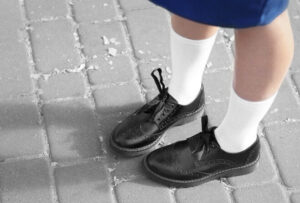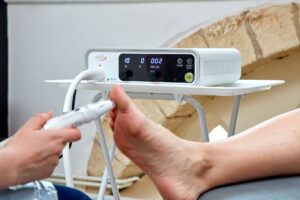Waking up with heel pain can be a frustrating start to your day. If you often find yourself wincing with every step when you get out of bed, you’re not alone. Morning heel pain is a common issue that can affect people of all ages. Understanding the possible causes and how to address them can help you start your day on the right foot.
Plantar Fasciitis (also known as Policeman’s heel).
One of the most common causes of heel pain, especially in the morning, is plantar fasciitis. This is a condition involving thickening and irritation of the plantar fascia, (the band of tissue that runs across the bottom of your foot, connecting your heel bone to your toes). When you rest or sleep, the plantar fascia shortens slightly. As you stand up either first thing in the morning or after resting for a few hours, and put weight on your feet, the tissue stretches, and if it is injured, this can cause pain.
Symptoms can include a sharp pain in the heel or in the arch of the foot, especially with the first steps in the morning. You may also get pain that decreases after a few minutes of walking, but may return after long periods of standing.
Heel Spurs
Heel spurs are now rarely considered to be a problem but they are another potential cause of morning heel pain. These are bony growths that develop on the bottom of the heel bone. While they themselves are generally not at all painful, they often occur in conjunction with plantar fasciitis and can exacerbate the discomfort.
Symptoms of heel spurs can include chronic pain in the heel that is worse in the morning or pain that may feel like a pin sticking into the bottom of your foot.
Achilles Tendonitis
Achilles tendonitis is a condition where your Achilles tendon is damaged. This tendon connects your calf muscles to your heel bone. Damage to this tendon can cause pain at the back of your heel and is often worse after periods of inactivity, like sleeping or resting for a few hours.
Symptons can include pain, particularly stiffness along the Achilles tendon in the morning or swelling and tenderness in the heel.
Treatment and Prevention
The best way to treat heel pain is to first have it diagnosed properly here at Supafoot so we can give you a targeted and specific treatment plan to get you out of pain as quickly as possible.
These are some of the ways you can start to help yourself.
- Stretching Exercises – Regular stretching of the calf muscles and plantar fascia can help alleviate and prevent heel pain. Simple exercises like toe stretches and calf stretches before you get out of bed can make a big difference.
- Supportive Footwear – Wearing shoes with good arch support and cushioning can help reduce stress on your heels. Avoid walking barefoot on hard surfaces.
- Orthotics – Custom orthotic devices from a Podiatrist can provide additional support for your feet, helping to distribute pressure more evenly and reduce strain on the plantar fascia and Achilles tendon.
- Rest and Ice – Giving your feet a break and applying ice to the affected area can help reduce inflammation and pain. Try to avoid activities that put excessive strain on your heels, like running or standing for long periods.
Advanced Podiatric Treatment
If your heel pain persists despite home remedies, head to Supafoot. Our podiatrists can help you with choosing the correct footwear, provide a custom orthotic device and if appropriate, we might recommend treatments such as shockwave or K-Laser therapy.
By understanding the causes and taking steps to treat and prevent the pain, you can improve your quality of life and start your day pain-free. If you’re experiencing persistent heel pain, please get in touch where one of our podiatrists would be happy to help.
Email on cheltenham@supafoot.com or call our friendly reception team on 01242321242.


